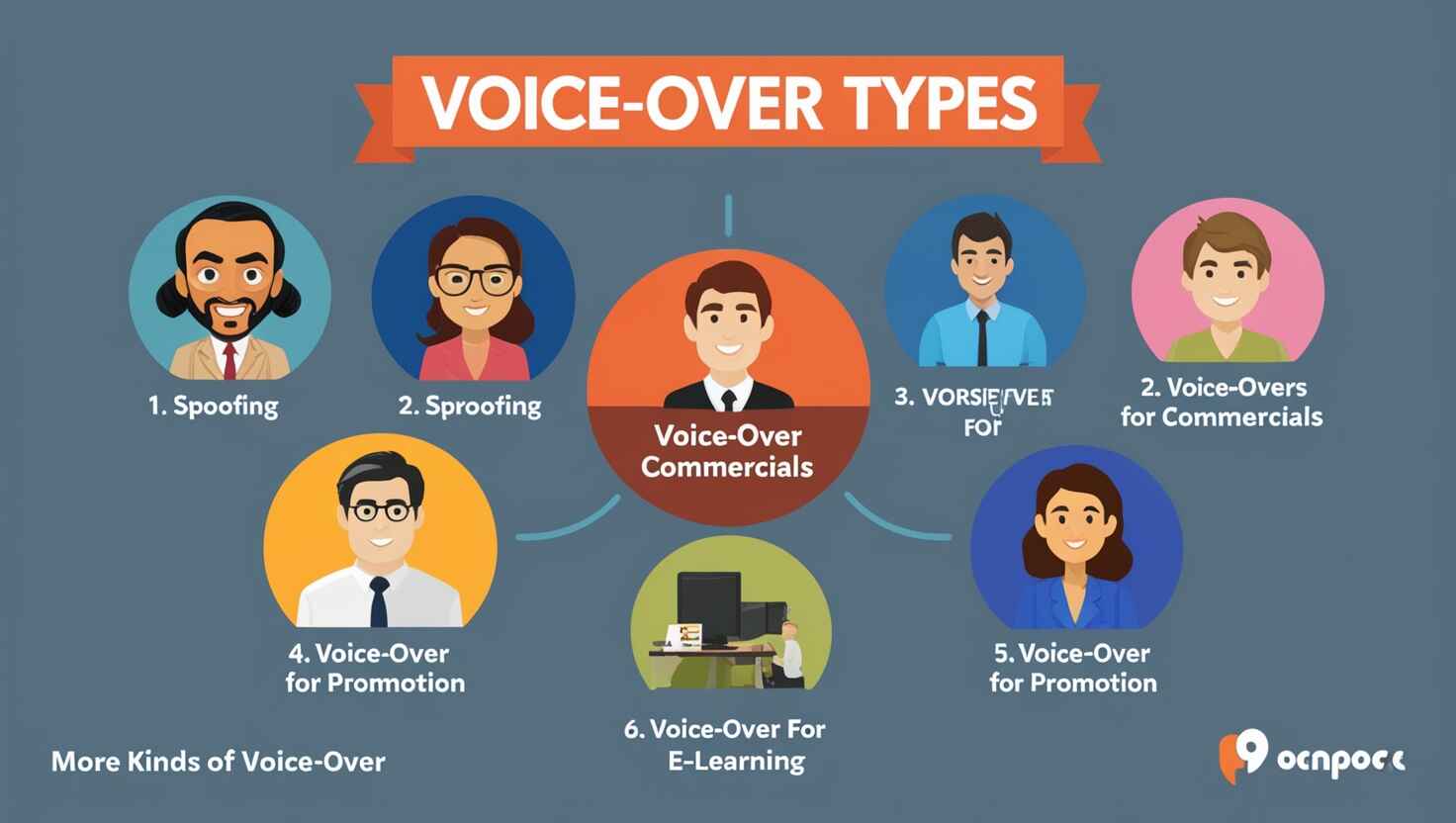The skill of utilizing your voice to narrate, play characters, or convey information for a variety of media including movies, TV series, commercials, audiobooks, video games, and documentaries is known as voice-over work. Voice actors breathe life into writings by utilizing their vocal prowess to captivate listeners and improve narratives. The need for talented voice actors has grown dramatically as a result of technological improvements and the expansion of digital platforms, offering many chances for people to make money from their profession.
Ways To Make Money Online By Providing Voice-Over Services:
Before dive into details let us know you what voice-over is
Voice-over, or VO, is a production method used in a variety of media such as audiobooks, video games, television shows, movies, and advertisements where a recorded voice is utilized but not part of the on-screen story. With the use of narration, commentary or more background, this method improves the tale by bringing nuance and feeling to it. Voice actors use their voice abilities to breathe life into characters and narratives, drawing listeners in and fostering an immersive atmosphere.
Things that involve voice-over:
1: Recording
2: Preparation of Script
3: Complete Production
4: Editing
Starting To Offer Voice-Over Services:

1: Make an Investment in High-Quality Equipment:
Investing in top-notch gear, including a good microphone, headphones, and soundproofing materials is crucial to success in voice-over work as it guarantees crystal-clear audio recordings.
2: Enhance Your Ability:
Improve your ability to express yourself both emotionally and versatilely by honing your vocal abilities through online classes, practice sessions, and observation of other accomplished voice actors.
3: Make a Showcase Video:
To properly promote your services and show potential clients what you can do, you must create a demo reel that features a variety of styles.
4: Create a Credible Portfolio:
You can draw in more business and demonstrate your versatility by compiling a professional portfolio with a variety of voice-over samples.
5: Make connections with professionals in the industry:
Making connections with voice actors and industry experts through networking might lead to chances for community engagement and employment.
6: Obtain Customer Input:
In the voice-over profession, getting customer comments may help you develop your abilities and build reputation.
7: Retain Your Professionalism:
Sustaining professionalism, fulfilling deadlines, and being receptive to criticism are essential for sustained success in the voice-over industry.
Voice-Over Applications:
- Media and Entertainment: Voice-over performers enhance narrative in entertainment and media by narrating documentaries, providing voices for animated characters, and dubbing foreign films. Cutscenes and in-game announcements in video games give characters life and create immersive experiences. Competent narrators are essential to audiobooks for reading books aloud, but captivating voice actors are advantageous to podcasts for audio plays and conversations. Persuasive voice-overs are used in advertisements to draw in viewers and successfully communicate brand messaging, which has a big influence on customer behavior and brand perception.
- Instruction: Voice-over is used in the education industry to improve understanding and retention through clear narration in e-learning courses, instructional videos, and language learning apps.
- Business and Corporate: Voice-over services improve training videos and presentations in the corporate and commercial world by offering compelling material and clear instructions. While music and interactive voice response (IVR) technologies make customer service frictionless, explainer movies aid in the simplification of difficult subjects.
- Additional Uses: Additional uses for voice-over include giving audio descriptions for accessibility, voicing virtual assistants, and mobile apps. These examples show how versatile voice-over is in meeting a range of demands, including public service announcements and campaigns.
Listen! You can work with more platforms to make money online, like Create And Sell Online Courses And Developing An App.
Let’s get to our topic:
Voice-Over Types:

- Spoofing: Dubbing is the process of substituting a new language voice for an actor’s original performance in movies or television shows. This requires exact timing and lip-syncing abilities to match the original performance and guarantee the story runs properly in the new language.
- Voice-Overs for Characters: Character voice-over is the process of giving animated characters, video games, and audio dramas distinctive voices. This kind allows for deep narrative by requiring adaptability and ingenuity to give characters life.
- Voice-Over for Commercials: Commercial voice-over is mostly used for promotions and ads. To effectively grab consumers’ attention, it needs to be delivered in a compelling and interesting way. This involves providing voice overs for radio and TV product advertisements to make sure the message is understood by the target audience.
- Voice-Over narration: For instructional products, audiobooks, and documentaries, narration voice-over is a must. Clarity, narrative skills, and the capacity to emote are required in order to improve the listener’s experience through insightful remarks.
- Voice-Over for Promotion: Internal communications, training materials, and corporate videos all employ promotional voice-over. This style is appropriate for teaching since it communicates information clearly and in a professional manner.
- Voice-Over for E-Learning: Voice-over is essential for instructional videos, language learning applications, and online courses in the e-learning space. It assists in narrating tutorials and classes, giving students understandable and interesting material.
- More Kinds of Voice-Over: Public service announcements, audio explanations for the blind, and voice-overs for radio jingles are examples of other formats. Voice actors may also provide voices for chatbots and virtual assistants, demonstrating the flexibility and breadth of uses for this talent.
Platforms For Voice-Over Artist:
There are several platforms given below for voice-over actors.
1:Voices.com
2: Voice123
3: Sound Better
4: Casting Call Pro
5: Backstage
6: Upwork
7: Fiverr
8: Casting Call Club
9: Mandy
10: Facebook Groups and Social Media
11: Bunny Studio
12: Audiobook Creation Exchange or called (ACX)
Required Skills For Being Voice-Over Artist:
- Voice Proficiency: A voice actor should have a powerful, distinct voice that is pleasing to listen to and easy to comprehend. This comprises a flexible vocal range to accommodate many characters and styles, as well as clarity and articulation for efficient communication. To effectively transmit the desired mood and hold the attention of the listener, mastery of pitch, tone, and tempo is essential.
- Technical Expertise: To ensure high-quality output and refine recordings, familiarity with recording equipment and audio editing software is essential. The quality of the job may be greatly affected by knowing how to set up and use microphones and audio interfaces.
- Capability To Act: It’s crucial to be able to use voice to give characters life. This entails character development and emotional expression, enabling the artist to express a range of emotions and provide unique voices that improve narrative in a number of media, including video games and animations.
- Marketing and Networking: Proficiency in self-promotion, fee negotiation, and financial management is vital for professional advancement. Developing contacts inside the sector can result in joint ventures, employment prospects, and insightful conversations.
- Expertise: Establishing trust with clients and colleagues is facilitated by retaining a pleasant attitude, timeliness, and reliability. Effective industrial collaboration necessitates professional and transparent communication.
- Flexibility: The ability to transition between many styles, tones, and formats with ease is essential for success in a variety of voice-over assignments, such as narration and advertising. Artists advance in their trade when they have the capacity to accept constructive criticism and a willingness to learn new things.
- Originality: To creatively interpret scripts and create original performances, imagination is essential. Furthermore, the ability to solve problems helps deal with unforeseen difficulties that arise during recording sessions, guaranteeing a seamless workflow.
Upcoming Challenges:
- Self Promotion: Effective self promotion takes work and perseverance, which may be difficult for many artists who find it difficult to set aside time and funds for it.
- Technical Problems: Voice actors may experience problems with their software or recording equipment. Having backup systems and a basic understanding of troubleshooting are essential.
- Income Variability: Particularly for independent contractors, earnings are subject to large swings. Stabilizing revenue may be achieved by cultivating a long-term clientele and broad clientele.
- Market Saturation: There are many skilled actors vying for few opportunities in the voice-over profession, which is very competitive. It’s essential to stand out with special abilities and a compelling portfolio.
- Work Life Balance: It may be difficult to juggle the responsibilities of voice-over work with obligations to your family and yourself.
- Pricing and Negotiation: It can be difficult, particularly for novices, to establish reasonable prices and engage in productive customer negotiations.
- Geographic Restrictions: While remote employment has increased options, a person’s location might still affect the availability of jobs and pay scales.
- Rejection and Criticism: Working in voice-over is a creative area, thus it’s common to encounter rejection and criticism. Resilience and feedback management skills are essential for keeping motivation levels high
. - Respect for Industry Standards: A successful profession depends on one’s ability to comprehend and abide by industry standards, rules, and copyright laws.
- Technological Advancements: In certain industries, the need for human voice actors may change as a result of the introduction of AI and text-to-speech technology.
Key To Success:
- Make a Demo Reel: Use a variety of voice samples to highlight your flexibility.
- Actively Network: Create relationships with professionals in the field to explore joint venture and opportunity prospects.
- Practice Often: Relentless practice improves your performance and abilities.
- Invest in High-Quality Equipment: To get clear recordings, soundproof your area and use a decent microphone.
- Accept Feedback: Make use of helpful criticism to improve your abilities.
- Preserve Professionalism: To foster confidence, be dependable, responsive, and talkative.
- Sell Yourself: Create a reputable website and advertise your work on social media.
- Be Prepared for Auditions: Always show up with your finest performance ready.
- Fairly Bargain: Talk about prices to make sure you’re getting paid fairly for the job you do.
- Have patience: It takes perseverance and time to build a great profession.
- Expand Your Skill Set: To make yourself more marketable, investigate several specializations.
- Dedicated to Learning: Seek out possibilities for skill improvement and keep up with market developments.
Advantages:
Voice-Over Artists benefit from flexibility since it allows them to work remotely and choose their own hours, which contributes to a balanced existence. Through the use of their voices, artists are able to give characters and tales life in this discipline, which offers a platform for creative expression. The sector offers a wide range of options, including instructional content, video games, audiobooks, and advertising. Skilled artists have the ability to command competitive prices, particularly in profitable sectors, which might result in large revenues. Many people are happy in their jobs because they like telling stories and interacting with people.
Through the industry, artists may interact with clients globally and make contacts with other professionals that lead to collaborations and new work opportunities. It is encouraged to constantly improve acting, singing, and audio editing techniques.
Some projects include residual payments, which provide continued financial advantages after the initial labor is completed. In addition, prospective artists may launch their careers with little financial outlay thanks to readily available technology and internet tools.
Disadvantages:
Voice-over employment comes with a number of difficulties, such as erratic pay since projects are not always available and there is fierce rivalry among skilled actors for scarce slots. Advances in technology such as artificial intelligence and text-to-speech might decrease the need for human voices in some industries. Even if working remotely gives you more freedom, your location might still have an impact on job rates and possibilities.
Attracting clients requires effective marketing and self-promotion, but these tasks might take time. The ability to manage industry norms and rules is essential for voice-over artists to succeed. It may be challenging to strike a balance between work and personal obligations, and novices frequently run into problems while negotiating and setting prices.
Handling rejection and unfavorable comments is a typical occurrence in the field, necessitating fortitude to maintain motivation.
Conclusion:
For those who are enthusiastic about speaking and storytelling, voice-over work offers a special combination of creativity, flexibility, and financial possibilities. But it also means negotiating a cutthroat market and overcoming obstacles like erratic revenue and advancing technology. Aspiring artists should concentrate on honing their craft, establishing a solid network, and effectively promoting themselves if they want to succeed in this fulfilling industry. In the fast-paced world of voice-over, anyone may achieve success and fulfillment with hard work and devotion.
FAQs:
1. Q) What typical difficulties do voice actors encounter?
A: Unpredictable income, the necessity for self-promotion, handling rejection and criticism, and keeping up with technical changes are common problems.
2. Q) Is a studio workspace required?
A: Even though a lot of voice actors work in professional studios, you may set up a home studio with the appropriate gear and soundproofing to create recordings of a high caliber.
3. Q) What credentials are necessary for becoming a voice actor?
A: Although not strictly necessary, having a decent voice, acting abilities, and reading or performance experience might be helpful. A lot of artists also attend courses or lessons in voice-over.
4. Q) What is the potential income for a voice actor?
A: The type of project, location, and experience all affect earnings, which might vary significantly. For a project, some voice actors may get paid a few hundred dollars, but others particularly in specialized markets may make thousands.
5. Q) Can I work part-time as a voiceover artist?
A: In order to have the freedom to manage other responsibilities while pursuing projects, a lot of voice actors do part-time employment.
6. Q) What benefits come with working as a voice actor?
A: Flexibility, creativity, and the possibility of large pay are all offered by voiceover work.



